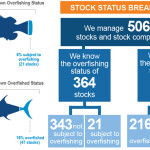Multiple seafood organizations in Scotland are urging the Scottish government to reject a proposal to establish highly protected marine areas (HPMAs) across 10 percent of the country’s coastline.
The government of Scotland launched a consultation process on which areas of the country’s coastline could be designated as HPMA. An HPMA, the government’s website said, would place strict limits on all human activity in the area, allowing only non-damaging recreational activities at “carefully managed levels.”
“One of the main aims of HPMAs is to protect a balanced representation of Scotland’s ecology from the coast to the deep sea, including both inshore and offshore environments,” the Scottish government said.
However, multiple seafood organizations are urging the government to abandon the idea of putting 10 percent of the nation’s coastline in HPMAs, saying there is little evidence they work.
“We support proposals that can improve Scotland’s marine environment. Scotland’s reputation for the very best farm-raised and wild-caught seafood depends on the seas around our coastline. However banning responsible sea use is not the answer,” Salmon Scotland Chief Executive Tavish Scott said.
The trade organization, Scott said, is concerned that any HPMA proposal would end up costing coastal jobs, without actually improving the environment in any measurable way.
“There appears virtually no scientific justification about what HPMAs are intended to achieve. Nor is there any evidence that aquaculture cannot coexist within HPMAs as we already do with marine protected areas,” Scott said. “We have grave concerns that HPMAs as currently proposed will result in significant job losses in some of our most fragile coastal communities, and damage the Scottish Government's own blue economy approach that supports sustainable economic growth.”
Scotland-based fishing organizations have also called for the HPMA proposals to be put on hold. Scottish Fishermen Federation Chief Executive Elspeth Macdonald said there has been a growing number of people calling the HPMA process flawed.
“Community groups, local authorities and MSPs from across the political spectrum have expressed their fears that designating at least 10 percent of Scotland’s seas as HPMAs will have far-reaching consequences for Scotland’s coastal and island communities and economies,” Macdonald said. “The HPMA policy arose from the political agreement between the Scottish Government and the Scottish Greens. It lacks a proper evidence base and does not articulate with any clarity what government is aiming to achieve.”
Scotland’s push to establish HPMAs is similar to that of the efforts of the U.S. government, particularly the efforts of the administration of U.S. President Joe Biden. Biden’s “30 by 30” executive order is pushing the government to establish some form of marine protected area over 30 percent of the country’s territorial waters.
The impact of protected areas on seafood and biodiversity has been debated for multiple years, with some studies finding that the MPAs had either no effect or a positive effect on catch totals, while others found some fishermen were impacted more negatively than others.
Some studies, like “Spillover benefits from the world’s largest fully protected MPA,” claim the areas provide benefits to nearby fishermen, while University of Washington Professor of Aquatic and Fishery Sciences Ray Hilborn released an analysis countering those claims.
The Scottish Fishermen’s Association pointed out that one-third of Scotland’s coastline is already designated for nature conservation – with the fishing industry and other stakeholders working together for sustainable seafood production.
“We believe this is the right route. Our industry is supportive of meaningful, scientifically based, and well-founded conservation, but the HPMA policy fails on both these fronts. This HPMA policy is far too high a price to pay for such vague and questionable aims,” Macdonald said. “We need policies that support nature conservation alongside sustainable, low-emission food production, and politically motivated HPMAs threaten that balance, with the government unable to provide any substance to why they believe they are needed.”
Photo courtesy of Salmon Scotland







